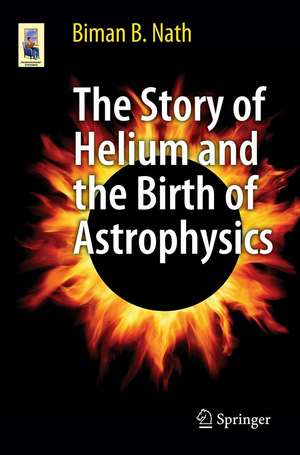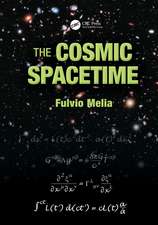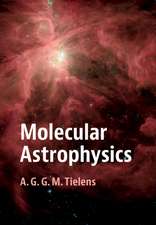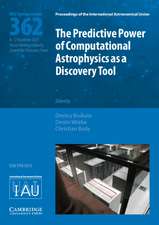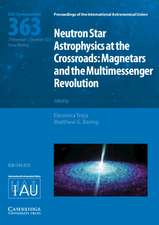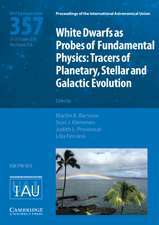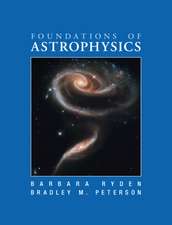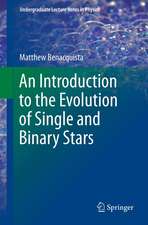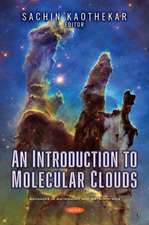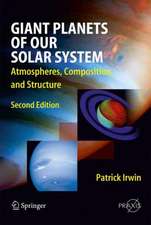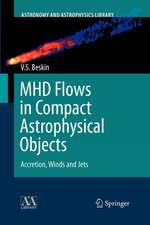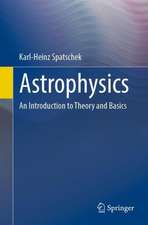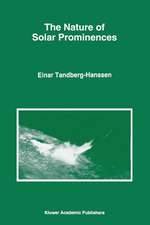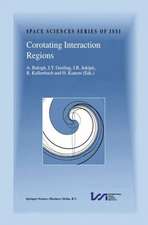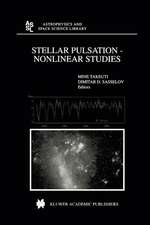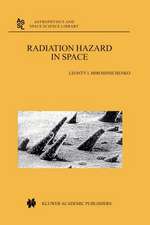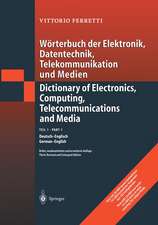The Story of Helium and the Birth of Astrophysics: Astronomers' Universe
Autor Biman B. Nathen Limba Engleză Paperback – 10 noi 2012
The truth is that Janssen never saw any sign of a new element during his observations in India. His reports and letters do not mention any such claim.
Other sources would have you believe that helium was jointly discovered by Janssen and Norman Lockyer, a British scientist, and that their discovery letters reached Paris the same day, one sent from India, and the other from England.
Again, the truth is completely different. Two letters from Lockyer and Janssen did reach Paris the same day in 1868, but their letters did not mention any new element. What they had discovered was a new way of observing the Sun without a solar eclipse. This would ultimately lead to the discovery of helium, in which Lockyer would play a prominent role, but not Janssen.
At the same time, Norman Robert Pogson, a disgruntled British astronomer stationed in India did notice something peculiar during the eclipse. He was the first one to notice something odd about the spectrum of the Sun that day, and his observations would prove crucial to Lockyer’s own investigations of helium. But Pogson’s report was never published inany peer reviewed journal and it languished on the desk of a local British officer in colonial India.
This book tells the real story behind the discovery of helium, along with biographical sketches of the scientists and descriptions of the milieu in which they worked. It will convey the excitement, confusion, and passion of nineteenth century scientists, using their own words, from their letters and reports.
“The Story of Helium and the Birth of Astrophysics” chronicles one of the most exciting discoveries ever made and explains why it also marked the birth of a new branch of science called ‘astrophysics.’
Din seria Astronomers' Universe
-
 Preț: 210.44 lei
Preț: 210.44 lei -
 Preț: 207.15 lei
Preț: 207.15 lei -
 Preț: 195.53 lei
Preț: 195.53 lei -
 Preț: 254.90 lei
Preț: 254.90 lei -
 Preț: 284.56 lei
Preț: 284.56 lei -
 Preț: 212.88 lei
Preț: 212.88 lei -
 Preț: 256.41 lei
Preț: 256.41 lei -
 Preț: 264.35 lei
Preț: 264.35 lei -
 Preț: 259.08 lei
Preț: 259.08 lei -
 Preț: 227.61 lei
Preț: 227.61 lei -
 Preț: 277.98 lei
Preț: 277.98 lei -
 Preț: 305.70 lei
Preț: 305.70 lei -
 Preț: 253.11 lei
Preț: 253.11 lei -
 Preț: 216.60 lei
Preț: 216.60 lei -
 Preț: 272.24 lei
Preț: 272.24 lei -
 Preț: 330.75 lei
Preț: 330.75 lei -
 Preț: 179.00 lei
Preț: 179.00 lei -
 Preț: 289.83 lei
Preț: 289.83 lei -
 Preț: 160.03 lei
Preț: 160.03 lei -
 Preț: 200.80 lei
Preț: 200.80 lei -
 Preț: 255.97 lei
Preț: 255.97 lei -
 Preț: 242.58 lei
Preț: 242.58 lei -
 Preț: 262.55 lei
Preț: 262.55 lei -
 Preț: 282.38 lei
Preț: 282.38 lei -
 Preț: 187.82 lei
Preț: 187.82 lei -
 Preț: 225.19 lei
Preț: 225.19 lei -
 Preț: 207.64 lei
Preț: 207.64 lei -
 Preț: 104.35 lei
Preț: 104.35 lei -
 Preț: 188.94 lei
Preț: 188.94 lei -
 Preț: 270.50 lei
Preț: 270.50 lei -
 Preț: 212.01 lei
Preț: 212.01 lei -
 Preț: 169.08 lei
Preț: 169.08 lei -
 Preț: 210.01 lei
Preț: 210.01 lei -
 Preț: 208.26 lei
Preț: 208.26 lei -
 Preț: 253.98 lei
Preț: 253.98 lei -
 Preț: 180.12 lei
Preț: 180.12 lei -
 Preț: 280.19 lei
Preț: 280.19 lei -
 Preț: 273.13 lei
Preț: 273.13 lei -
 Preț: 207.39 lei
Preț: 207.39 lei -
 Preț: 208.70 lei
Preț: 208.70 lei -
 Preț: 214.86 lei
Preț: 214.86 lei -
 Preț: 188.94 lei
Preț: 188.94 lei -
 Preț: 194.65 lei
Preț: 194.65 lei -
 Preț: 277.34 lei
Preț: 277.34 lei -
 Preț: 187.15 lei
Preț: 187.15 lei -
 Preț: 210.93 lei
Preț: 210.93 lei
Preț: 212.01 lei
Nou
Puncte Express: 318
Preț estimativ în valută:
40.57€ • 42.66$ • 33.52£
40.57€ • 42.66$ • 33.52£
Carte disponibilă
Livrare economică 26 martie-09 aprilie
Preluare comenzi: 021 569.72.76
Specificații
ISBN-13: 9781461453628
ISBN-10: 1461453623
Pagini: 288
Ilustrații: XI, 274 p. 37 illus., 6 illus. in color.
Dimensiuni: 155 x 235 x 15 mm
Greutate: 0.41 kg
Ediția:2013
Editura: Springer
Colecția Springer
Seria Astronomers' Universe
Locul publicării:New York, NY, United States
ISBN-10: 1461453623
Pagini: 288
Ilustrații: XI, 274 p. 37 illus., 6 illus. in color.
Dimensiuni: 155 x 235 x 15 mm
Greutate: 0.41 kg
Ediția:2013
Editura: Springer
Colecția Springer
Seria Astronomers' Universe
Locul publicării:New York, NY, United States
Public țintă
Popular/generalCuprins
Chapter 1: The Unbearable Lightness of a 'Noble' Element.- Chapter 2: From Alchemy to Chemistry.- Chapter 3: From Chemistry to Stars.- Chapter 4: Father Secchi, the Priest Who Became an Astronomer.- Chapter 5: Jansse, A Traveling Scientist.- Chapter 6: Norman Lockyer, Clerk Turned Astronomer.- Chapter 7: James F. Tennant, Soldier Turned Astronomer.- Chapter 8: Guntur, the Small Town at the Center of Attention.- Chapter 9: The Perpetual Eclipse of 1868.- Chapter 10: Lockyer and His Cosmic Hieroglyphics.- Chapter 11: The Ghost Element That Refused To Be Identified.- Chapter 12: Helium on Earth.- Chapter 13: The Folklore and Reality of the Discovery of Helium.- Index.
Recenzii
From the reviews:
“This book is a labor of love and a rather personal document, shedding light on a portion of physics and chemistry history that previously seems to have received too little careful analysis. … Astronomer Nath … has done some key detective work in mid-19th-century physics, starting with helium and expanding into the transformational perspective created by spectroscopy. … a fine book that makes good reading and fills a gap in the literature. It belongs in all college libraries. Summing Up: Highly recommended. All readership levels.” (K. L. Schick, Choice, Vol. 50 (11), July, 2013)
“Biman Nath clearly loves helium, and you very probably will too after reading this book. … I think typical ageing astronomers will enjoy the book … .” (Virginia Trimble, The Observatory, Vol. 133 (1233), April, 2013)
“This book is a labor of love and a rather personal document, shedding light on a portion of physics and chemistry history that previously seems to have received too little careful analysis. … Astronomer Nath … has done some key detective work in mid-19th-century physics, starting with helium and expanding into the transformational perspective created by spectroscopy. … a fine book that makes good reading and fills a gap in the literature. It belongs in all college libraries. Summing Up: Highly recommended. All readership levels.” (K. L. Schick, Choice, Vol. 50 (11), July, 2013)
“Biman Nath clearly loves helium, and you very probably will too after reading this book. … I think typical ageing astronomers will enjoy the book … .” (Virginia Trimble, The Observatory, Vol. 133 (1233), April, 2013)
Notă biografică
Biman Nath studied physics at the University of Delhi, India and received his Ph.D. in astronomy from the University of Maryland, College Park, in the United States. He is currently at the Raman Research Institute in Bangalore, India. His research focuses on the interaction of gas with galaxies and its implications for the evolution of galaxies and diffuse gas in the universe. He is also interested in the popularization of science and writing fiction.
Textul de pe ultima copertă
Biman Nath
The Story of Helium and the Birth of Astrophysics
Helium was the first element ever discovered by astronomers. Its presence was first indicated in the Sun and not on Earth. Further, its discovery marked the birth of the new science of astrophysics.
However, it turns out that the events leading to the discovery of helium have been rather misrepresented in books, journals, and even encyclopedias. The usual story about its joint discovery during a solar eclipse in 1868 by French astronomer Pierre Janssen and late in England by Norman Lockyer, is far from the truth. Janssen never mentioned any new spectral line in his reports.
The actual story turns out to be as dramatic as in fiction. This book tells the story without jargon, using the words of the scientists themselves (from their letters and reports), and rescues the real story from the backwaters of history.
The Story of Helium and the Birth of Astrophysics
Helium was the first element ever discovered by astronomers. Its presence was first indicated in the Sun and not on Earth. Further, its discovery marked the birth of the new science of astrophysics.
However, it turns out that the events leading to the discovery of helium have been rather misrepresented in books, journals, and even encyclopedias. The usual story about its joint discovery during a solar eclipse in 1868 by French astronomer Pierre Janssen and late in England by Norman Lockyer, is far from the truth. Janssen never mentioned any new spectral line in his reports.
The actual story turns out to be as dramatic as in fiction. This book tells the story without jargon, using the words of the scientists themselves (from their letters and reports), and rescues the real story from the backwaters of history.
Caracteristici
Tells the true story behind the discovery of helium while explaining how the curiously distorted narrative of its discovery came into existence Includes interesting facts and anecdotes in the narrative, about the personalities of the scientists and the time in which they lived Explains the concepts behind the scientific adventures of the nineteenth century in clear and simple language Includes supplementary material: sn.pub/extras
